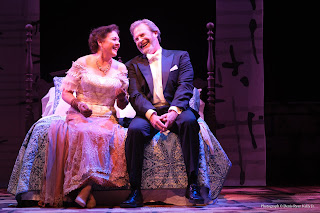ISO under Märkl breasts the tides once again in ocean-oriented program
Fortunately not like Wagner's Flying Dutchman, Jun Märkl and the Indianapolis Symphony Orchestra have landed significantly together before setting sail again with another sea-themed voyage. In 2014, the German-Japanese conductor's fitness for the job he now holds was evident. Not that he was unloved by the larger musical world, but Märkl's mutual admiration with the ISO has an official seal on it with his appointment as the ISO's eighth music director.
Die Frist ist um, und abermals verstricken sind sieben Jahr', sings the opera's title character in his first presentation, telling the audience through monologue that, after another fated seven-year period at sea, he has just about given up finding an end to his wanderings through a woman's true love.
Well, it's been seven years since Märkl directed the ISO into safe harbor with a similar program. Two of the works — Elgar's "Sea Pictures" and Debussy's "La Mer" — are repeated this weekend under the new maestro's baton. And the true love seems to be intact.
And what's more, this time around, though the 2017 guest soloist in Elgar's piece was up to her task, ISO
 |
| Jamie Barton, guest soloist |
audiences are being treated to extraordinary richness of tone and diction from Jamie Barton, an award-winning alumna of Indiana University's Jacobs School of Music.
With superb support from the orchestra under Märkl's baton, Barton characterized each of the five songs fully. Her facial expressiveness was vivid, but also backed up essentially by well-managed phrasing and a firm interpretive sense of when to soar and when to dial back the intensity.
Her mezzo-soprano had the contralto depth that's often needed, and the higher reaches of the part were also brilliantly in her command. As for nuance, the repeated "Good night" concluding "Sea Slumber Song," the first of the set, was as varied as it would be in a mother's tenderest lullaby.
The partial quotation of texts in the program book helped put the work across, and audience members able to see the screen above the stage clearly could also follow word for word the poems Elgar set. That assistance was missing in 2017.
 |
| ISO music director in action before his appointment here |
The ISO is now Märkl's own. As remarkable as his achievement as a frequent guest conductor has been over the past few decades, this concert confirmed that his stamp has been firmly set on the ensemble. He is a captain fully comfortable in the role. "I hope you will get really wet," he said facetiously to the crowd that gathered for the pre-concert "Words on Music."
In those remarks, he also announced his desire to connect the tone-painting aspects of the program's four works to the emotions that great bodies of water seem to have aroused in fine composers. In that respect, I wish ISO's marketing and publicity had made more of Ethel Smyth's inclusion as one of the four composers.
I'm no marketing expert, but it seems to me that an unfamiliar name could have aroused public interest in advance. Shipmates on the order of Mendelssohn, Elgar and Debussy would be asked (in effect) to roll over slightly to give room to this long-lived English composer, who also fought for women's rights when it was dangerous to do so.
Smyth's "On the Cliffs of Cornwall," prelude to the second act of "The Wreckers," her seldom-produced opera, opens "The Sea" program. It deserves its place among the other three masterpieces. Its ingenuity of orchestration allows for the score's constant activity never to drift toward clotted textures. It incorporates big swells of sound true to the hard-to-predict turbulence of the English Channel where it transitions into the Atlantic Ocean.
The second half put the concert on more familiar nautical ground. Mendelssohn's Hebrides Overture had the clarity of event perhaps unexpected in picturesque music that has no story to tell. Sectional interplay was fully three-dimensional; the cello section, for example, could hardly have sounded more first-rate than it did in its high-profile melody.
Then, to crown the whole effort (which was repeated this afternoon at 5:30), Debussy's "La Mer" sounded like a fresh discovery Friday night. Debussy fires the listener's imagination in suggesting the huge volume of the sea and, in the first movement, how the water seems to both absorb light and reflect it. The second movement, titled "Play of the Waves," was especially well-defined. There was air threaded between its phrases, and a fine acceleration near the end.
"La Mer" has many moments of isolated exposure among all the massive effects. One of the "conductorzilla" stories I've heard, from a provincial orchestra I knew long ago, involves a principal trumpeter who flubbed the conclusion of what might be called "the storm chapter" of the last movement, "Dialogue of the Wind and the Sea." As matters subside, the trumpet has a high held note that ascends delicately to one above. The first-chair player, normally reliable, missed it at the final rehearsal. Backstage, the conductor said to him: If you do that at the concert, you're out of here. Terrible labor-management relations, for sure, but the trumpeter nailed it in performance and kept his chair.
Everything seemed shipshape Friday night with the ISO, thanks to careful preparation and a level of mastery that's more of the norm with the ISO than the orchestra in my hometown. There's also the intangible value of the solid rapport between a conductor and an orchestra who have found their sea legs.



Comments
Post a Comment